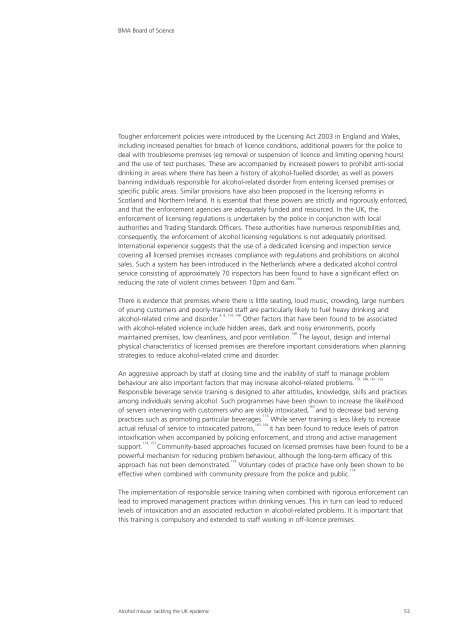Alcohol misuse: tackling the UK epidemic - London
Alcohol misuse: tackling the UK epidemic - London
Alcohol misuse: tackling the UK epidemic - London
You also want an ePaper? Increase the reach of your titles
YUMPU automatically turns print PDFs into web optimized ePapers that Google loves.
BMA Board of Science<br />
Tougher enforcement policies were introduced by <strong>the</strong> Licensing Act 2003 in England and Wales,<br />
including increased penalties for breach of licence conditions, additional powers for <strong>the</strong> police to<br />
deal with troublesome premises (eg removal or suspension of licence and limiting opening hours)<br />
and <strong>the</strong> use of test purchases. These are accompanied by increased powers to prohibit anti-social<br />
drinking in areas where <strong>the</strong>re has been a history of alcohol-fuelled disorder, as well as powers<br />
banning individuals responsible for alcohol-related disorder from entering licensed premises or<br />
specific public areas. Similar provisions have also been proposed in <strong>the</strong> licensing reforms in<br />
Scotland and Nor<strong>the</strong>rn Ireland. It is essential that <strong>the</strong>se powers are strictly and rigorously enforced,<br />
and that <strong>the</strong> enforcement agencies are adequately funded and resourced. In <strong>the</strong> <strong>UK</strong>, <strong>the</strong><br />
enforcement of licensing regulations is undertaken by <strong>the</strong> police in conjunction with local<br />
authorities and Trading Standards Officers. These authorities have numerous responsibilities and,<br />
consequently, <strong>the</strong> enforcement of alcohol licensing regulations is not adequately prioritised.<br />
International experience suggests that <strong>the</strong> use of a dedicated licensing and inspection service<br />
covering all licensed premises increases compliance with regulations and prohibitions on alcohol<br />
sales. Such a system has been introduced in <strong>the</strong> Ne<strong>the</strong>rlands where a dedicated alcohol control<br />
service consisting of approximately 70 inspectors has been found to have a significant effect on<br />
reducing <strong>the</strong> rate of violent crimes between 10pm and 6am. 160<br />
There is evidence that premises where <strong>the</strong>re is little seating, loud music, crowding, large numbers<br />
of young customers and poorly-trained staff are particularly likely to fuel heavy drinking and<br />
4, 8, 114, 148<br />
alcohol-related crime and disorder. O<strong>the</strong>r factors that have been found to be associated<br />
with alcohol-related violence include hidden areas, dark and noisy environments, poorly<br />
maintained premises, low cleanliness, and poor ventilation. 148<br />
The layout, design and internal<br />
physical characteristics of licensed premises are <strong>the</strong>refore important considerations when planning<br />
strategies to reduce alcohol-related crime and disorder.<br />
An aggressive approach by staff at closing time and <strong>the</strong> inability of staff to manage problem<br />
114, 148, 161, 162<br />
behaviour are also important factors that may increase alcohol-related problems.<br />
Responsible beverage service training is designed to alter attitudes, knowledge, skills and practices<br />
among individuals serving alcohol. Such programmes have been shown to increase <strong>the</strong> likelihood<br />
of servers intervening with customers who are visibly intoxicated, 163<br />
and to decrease bad serving<br />
practices such as promoting particular beverages. 114<br />
While server training is less likely to increase<br />
163, 164<br />
actual refusal of service to intoxicated patrons, it has been found to reduce levels of patron<br />
intoxification when accompanied by policing enforcement, and strong and active management<br />
114, 153<br />
support. Community-based approaches focused on licensed premises have been found to be a<br />
powerful mechanism for reducing problem behaviour, although <strong>the</strong> long-term efficacy of this<br />
approach has not been demonstrated. 114<br />
Voluntary codes of practice have only been shown to be<br />
effective when combined with community pressure from <strong>the</strong> police and public. 114<br />
The implementation of responsible service training when combined with rigorous enforcement can<br />
lead to improved management practices within drinking venues. This in turn can lead to reduced<br />
levels of intoxication and an associated reduction in alcohol-related problems. It is important that<br />
this training is compulsory and extended to staff working in off-licence premises.<br />
<strong>Alcohol</strong> <strong>misuse</strong>: <strong>tackling</strong> <strong>the</strong> <strong>UK</strong> <strong>epidemic</strong> 53
















